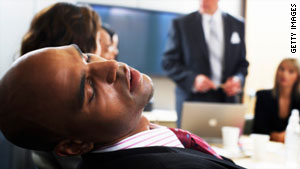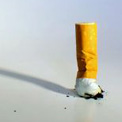
Sleep experts say habitually sleeping more than 10 hours can be indicative of other medical problems
(CNN) -- Instead of feeling crisp and refreshed, Jesse Wu wakes up sluggish after 12 hours of sleep.
"If I sleep the right amount, I feel really good," said the 25-year-old who lives in a suburb of Chicago, Illinois. "If I sleep too long, I feel groggy throughout the whole day."
Like Wu, some feel exhausted after long hours of rest.
"Many people will tell you, they sleep a little worse when they sleep a long time on weekends," said Dr. Daniel Kripke, co-director of Scripps Clinic Sleep Center in La Jolla, California. "Too much long sleep on weekends does not seem to make people feel better." But he acknowledged that the reasons haven't been determined.
For years, doctors have warned about the dangers of not getting enough shuteye -- traffic accidents, weight gain, decreased productivity and immune protection, but the effects of oversleeping are not well-understood. There isn't medical evidence to recommend that people who sleep long hours should change their habits, Kripke said.
Daylight saving time ends this Sunday, giving sleepers a bonus hour of sleep.
Wu savors his sleep. "I really enjoy it," he said. In the morning, he needs five alarms -- each with a different sound -- that he smacks as he lumbers out of bed.
Like many professionals, Wu sleeps little on the weekdays (about five hours) and makes up for it on weekends, spending eight to 12 hours blissfully hibernating. Sometimes, after a long stretch, he wakes up too tired to function.
"After I've gotten so much sleep, the first situation is I fall asleep at 10 p.m., even though I've gotten 12 hours of sleep, because I feel so groggy," said Wu, who works as a membership coordinator for a professional association.
This is known as sleep drunkenness, when a person hovers between sleep and wakefulness, said Dr. Lisa Shives, medical director at Northshore Sleep Medicine in Evanston, Illinois. In one case, a patient who had sleep drunkenness came to the emergency room because his wife thought he had a stroke.
"They'll wake up and be in this weird state of sleep drunkenness," Shives said. "If it's really severe, you're not going to be in any state to make decisions. If it's just regular [case], a lot of us feel 'blah,' and most of us have to carry on and get going on a shower and cups of coffee."
Oversleeping once in a while doesn't present serious health risks, experts say.
But if you habitually sleep excessively, it could be the result of an underlying health problem. And it could be cutting into your life span.
"There's been at least two epidemiological studies to show that if people get less than five hours, or more than 10 hours of sleep, it increases their mortality," said Michael Breus, the clinical director of the sleep division at Southwest Spine and Sports in Scottsdale, Arizona.
A 2007 Finnish study found that the mortality risks increased by about 20 percent for people who slept more than eight hours. That same year, a British study found that people who slept five hours or less and those who slept more than eight hours also faced increased risks. Another study showed that people who routinely slept more than eight hours a night had a greater chance of stroke than others with less sleep.
Scientists say sleep and longevity are somehow associated, but there might be confounding factors.
"We don't know if it's the long sleep. It could be something else causing illness and the long sleep," said Kripke, who has researched the topic for 35 years.
Here are possible factors for habitually excessive sleep, known as hypersomnia:
• Problem: Poor-quality sleep
A person could sleep the recommended amount, but still feel tired because he or she got poor quality sleep.
"Oftentimes, we only think of sleep in terms of minutes -- but that's really the quantity of sleep. In fact, there's a quality of sleep," said Breus, author of the book "Beauty Sleep."
The average sleep cycle takes 90 minutes to complete. It starts from stage 1, the lightest sleep, and progresses to deeper levels through stage 4. Then, it continues to rapid eye movement (REM) sleep when the person dreams.
"When you have poor quality sleep, you spend a lot of time in stage 1 sleep," said Shives, a spokesperson for the American Academy of Sleep Medicine. "You will tend to want to sleep longer to make up for the quality and increasing quantity."
Problems: Genetics Some people naturally thrive on little sleep. And then, there are others who flourish after nine hours.
"It's only when you go less than six and a half hours of sleep, we call you a short sleeper; more than 9.5 hours, we call you a long sleeper," Shives said. "We think there's something genetic."
A study published this year in the journal Science identified a mutated gene in a mother-daughter pair that allowed them to function on six hours of sleep. The research conducted by University of California, San Francisco scientists is believed to be the first to discover a gene, hDEC2 involved in regulating sleep length. This finding could someday lead to a better understanding of why some people require more sleep.
 Quit Once, Quit Again, Quit for Good
Quit Once, Quit Again, Quit for Good

